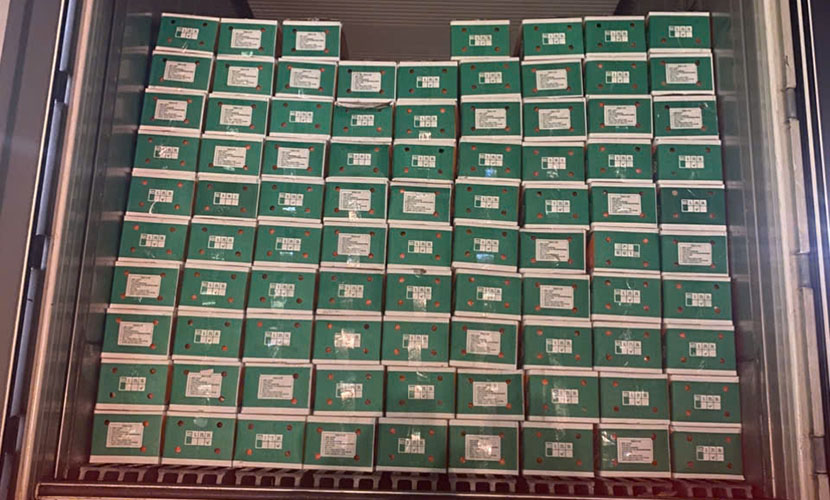
Ms. Phung Thi Hao was a farmer in Duc Chinh commune, Cam Giang district, Hai Duong province. From renting land to grow carrots, she has become the leading factory of Hai Duong carrots for export.
Currently, Duc Chinh has 12 facilities engaged in the purchase and processing of fresh carrots. Among them, Ms. Hao’s family-run business consistently ranks among the top in terms of volume of carrots purchased and processed.

Hai Duong carrots for export
In 1992, Ms. Hao married Mr. Vu, a fellow villager. The couple worked tirelessly together to improve their household’s economy. In 2002, they rented 8,640 square meters of riverside farmland in Nam Sach district to grow Hai Duong carrots. Accordingly, they became one of the first households to take the initiative in renting land for carrot cultivation.
Through her observations, Ms. Hao quickly recognized the high development potential of Hai Duong fresh carrots, due to their wide market appeal. Currently, 70% of Hai Duong’s carrot output is grown for export. A small portion is consumed within the province, with the remainder distributed domestically.
The year 2007 marked a turning point when Ms. Hao and her husband decided to stop growing carrots themselves. Instead, they focused entirely on purchasing and processing them. As a pioneer in Duc Chinh, the initial stages of the business were modest. The family purchased just three water pumps and hired 5–7 workers to wash carrots manually.
However, manual washing proved labor-intensive and inefficient, unable to meet market demands. Realizing this, the couple decided to adopt a more methodical and scalable approach. “To meet the growing market demand and improve product quality, we needed machinery,” Ms. Hao shared.

Hao’s packing house of Hai Duong carrots
Putting thought into action, the family took out bank loans and received support from relatives and friends. Eventually, they invested over VND 10 billion to rent land and build a 572-square-meter processing facility of Vietnamese carrots. This facility included eight carrot processing lines and three cold storage units. It was capable of holding up to 600 tons of fresh carrots.
To ensure proactive sourcing, in addition to purchasing from local agents, Ms. Hao also invested in two trucks to collect fresh carrots directly from farms. In addition, she bought three forklifts for loading fresh carrots to containers. Initially focused on domestic markets, the family business gradually expanded into exports. Today, her family has signed direct export contracts to countries like South Korea, Malaysia, and Dubai.
To enhance product value and access high-standard export markets, Vietnam’s fresh carrots should comply with phytosanitary regulations of importing countries. Therefore, Ms. Hao’s facility has worked closely with carrot-growing areas in Hai Duong to control pesticide residues. All sourcing contracts are traceable and tied to specific regions and growers. “This traceability is key to establishing a production model geared toward exports,” Ms. Hao noted.
Ms. Hao actively participates in training courses and scientific-technical transfer programs. She continuously seeks new markets, monitors trade information channels, and regularly attends carrot and agricultural product trade conferences in Hai Duong province. She also connects with domestic and international businesses and participates in agricultural trade fairs.

Loading Hai Duong carrots for export
According to Ms. Hao, through various online trade events, representatives of Vietnam Trade Offices in countries have shared useful information about consumer habits, product standards, and technical trade barriers. These insights help Vietnam’s agricultural export businesses like hers tailor their operations to meet the specific import requirements of each market.
Currently, Ms. Hao’s family purchases over 10,000 tons of Vietnam’s carrot materials annually. Their total yearly revenue reaches approximately VND 50 billion. The net profits reaches about VND 2 billion after expenses. Her facility provides stable, long-term employment for 10–15 workers and seasonal work for 40–50 more, with average monthly incomes exceeding VND 10 million per person.
“Business models like Ms. Hao’s are crucial in shaping a commodity-oriented approach to carrot production, processing, and consumption in our area. Carrots truly bring high economic value to farmers, and local livelihoods have significantly improved as a result,” confirmed Mr. Tuong, Chairman of Duc Chinh Commune.
Thanks to her outstanding production and business achievements, Ms. Hao’s family has been honored as a “provincial-level outstanding farming household” for 17 consecutive years, from 2007 to 2023.
Vietnamese source: https://baohaiphong.vn/nguoi-phu-nu-dua-cu-ca-rot-hai-duong-di-xa-383484.html
